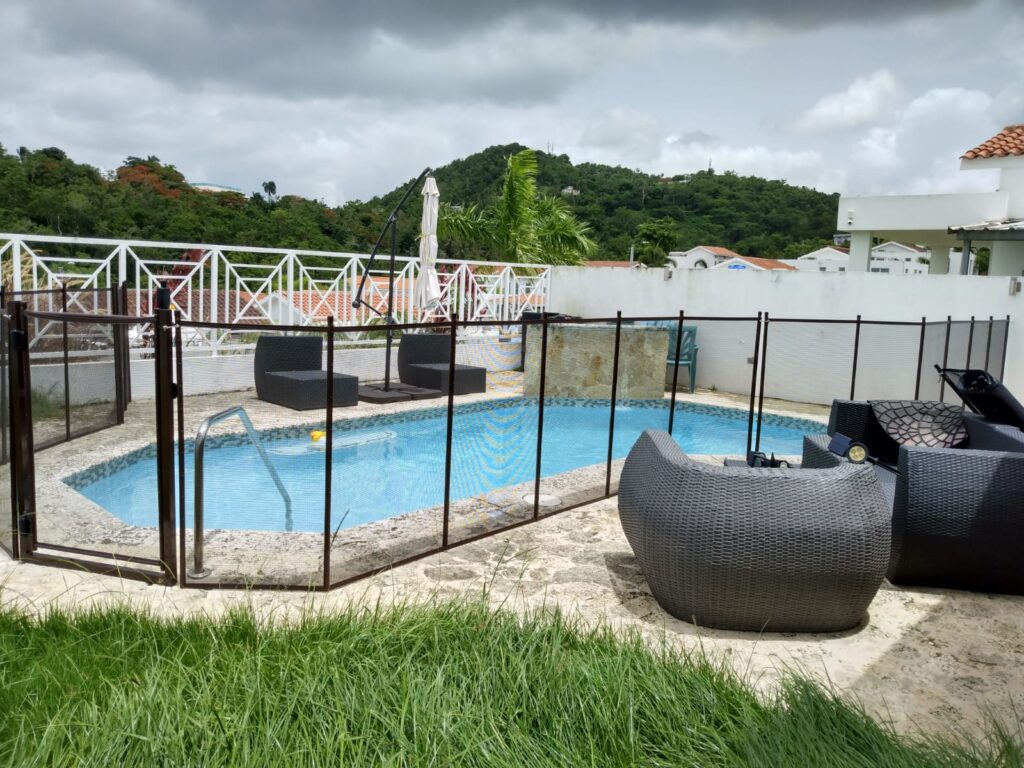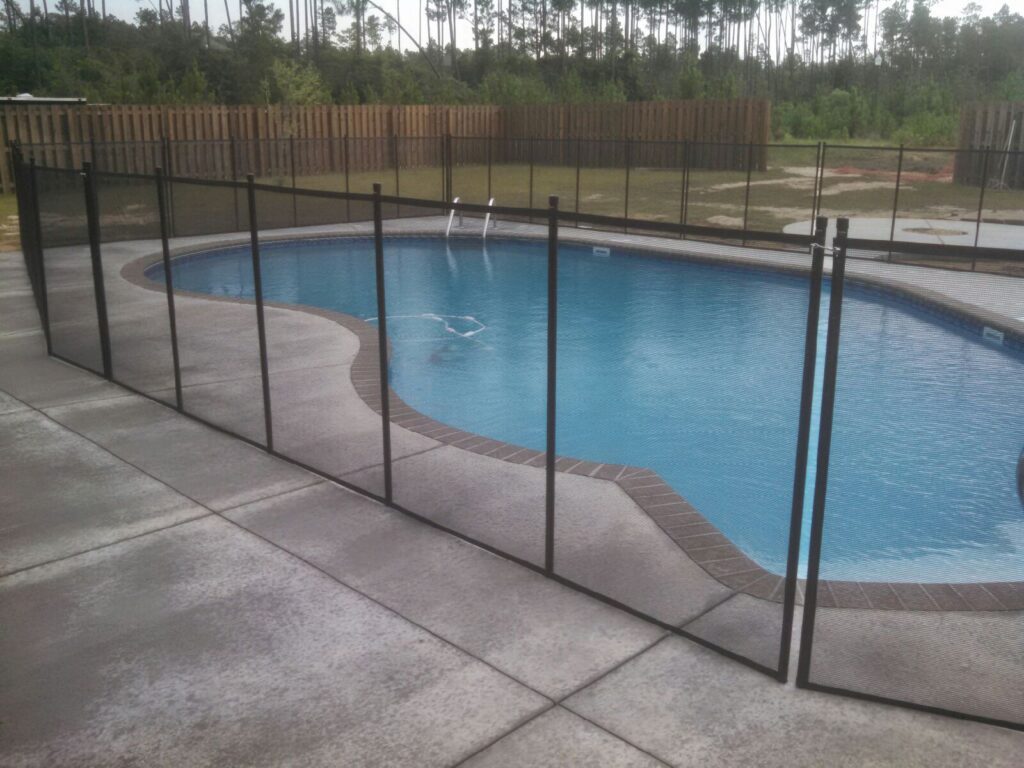Think your backyard pool is ready for summer? Georgia law might disagree.
Most pool owners are unaware that something as simple as a missing latch or a lower fence could lead to legal trouble, or worse, an unpreventable accident. The Georgia pool fence code isn’t just a set of recommendations, but a mandatory safety standard designed to protect lives, especially children under the age of five, who face the highest drowning risk in the state.
Here, we’ll walk you through the exact pool fence requirements Georgia mandates, and explain why it’s important to always check with your local City Hall Zoning Dept. If you want a peace of mind, full legal compliance, and a safer backyard, this is where you start.

Georgia state law mandates specific standards for residential and public enclosures as outlined in Chapter 511- 3- 5 of the Rules and Regulation of the State of Georgia. Here, we’ll only focus on the standards regarding residential enclosures. Any pool deeper than 24 inches requires a code-compliant fence. Here’s a breakdown of what the pool fence code in Georgia requires:
The Georgia pool fence code clearly mandates that any pool deeper than 24 inches must be enclosed by a barrier completely surrounding the pool that is at least 48 inches tall, measured on the side of the barrier which faces away from the swimming pool. This isn’t just a suggestion. It’s a legal requirement intended to prevent unsupervised access, particularly by small children who are at the highest risk of drowning.
Should the fence exceed the minimum requirement, such as 54, 58, and 70 inches, you’ll likely have to get zoning permits.
Even the tallest fence won’t keep your pool area secure if the gate doesn’t meet code. Under the Georgia pool fence code, gates play a critical role in safety, as they serve as the primary access to the pool.
To meet Georgia residential swimming pool regulations & requirements, pool fencing manufacturers should make sure that every gate providing access to a pool must adhere to the following legal standards:
In case the latching mechanism is located less than 54 inches from the bottom of the gate then the release mechanism shall be:
By enforcing automatic closure and high latch placement, these rules keep gates from being left open and help stop children from entering the pool area unsupervised.
Even the smallest gap in your fence can become a serious safety hazard. That’s why the Georgia pool fence code sets strict limits on how wide the spaces between pickets, panels, and under the fence can be. These rules are in place to prevent children from squeezing through, crawling under, or using footholds to climb over the barrier.
Here’s what you need to meet compliance:
The state of Georgia requires that any opening for a pool fence be less than 4 inches wide. Should a 4-inch sphere pass through the gap, your fence will be deemed incompliant with Georgia pool fence code. Solid barriers that don’t have openings are not allowed to have protrusions to prevent children from climbing.
If your pool barrier includes horizontal and vertical slats, specific spacing rules apply. When the distance between horizontal members is 45 inches or more, the spacing between vertical slats must not exceed 4 inches. However, if the horizontal members are less than 45 inches apart, they must be placed on the pool side of the fence to prevent them from being used as a climbing aid. Additionally, if your fence includes decorative cutouts or ornamental designs, those openings must be no wider than 1¾ inches to meet Georgia’s pool fence code.
If your residential pool is enclosed by a chain link fence, the maximum mesh size must not exceed 1¾ inches. However, if the fence includes slats that are securely fastened at the top or bottom, it may be permitted even if the openings are slightly larger. Chain link fences that do not meet this requirement are not allowed to serve as a compliant pool barrier under the Georgia pool fence code. The same applies for a barrier composed of diagonal members.
Answer the questions honestly to assess your compliance. If you’re unsure about any answers, it might be time to review the regulations or consult a professional.
Let’s find out if your pool area is up to code!
Fulton County enforces stricter pool fencing laws than the Georgia state minimum pool fence requirements, and securing a Fulton County pool permit requires meeting these local standards. All cities, including Atlanta, must follow the specific barrier rules for residential pools before final approval.
| Requirement | Details |
| Fence Height | Minimum height of 5 feet (60 inches) is required for all fences enclosing pools. |
| Gaps & Openings | Openings must not allow a 4-inch sphere to pass through. Horizontal members shall be separated by a minimum of 48 inches of unclimbable vertical space to avoid foot or hand hold. |
| Pool Gates | Gates must self-close and self-latch, with latches installed at least 54 inches high and gates swinging away from the pool. |
If you are looking for a safe and reliable pool fence in Atlanta specifically, it’s time to explore professional pool fence installation and top-rated pool fence installers in Atlanta to secure your home today.
Jackson County pool fence requirements adhere closely to the Georgia state pool fence code and may require fence details at the time of permit application.
| Requirement | Details |
| Fence Height | Minimum 48 inches (4 feet) from finished grade. |
| Gaps & Openings | Maximum spacing: 4 inches between vertical elements; 2 inches max clearance under fence if surface is loose (e.g., gravel). |
| Pool Gates | Gates must be self-closing, self-latching, and swing outward. Latch must be 54 inches high or more. |
Cobb County, home to Marrietafollows the 2018 International Swimming Pool and Spa Code as the foundation for pool safety, including strict fencing standards for all new residential pools. Permits and inspections are required for most installations.
| Requirement | Details |
| Fence Height | Minimum height of 4 feet (48 inches) is required around all residential swimming pools. |
| Gaps & Openings | Gaps must not exceed 4 inches. Decorative cutouts and horizontal elements must prevent climbing; spacing must not provide hand or footholds. |
| Pool Gates | Gates must be self-closing and self-latching, open away from the pool, and have latches at least 54 inches from ground level. |
Need a legal pool fence in Marietta? Work with expert pool fence installers in Marrieta who understand local code and can help you pass inspection the first time.
Chatham County, home to the largest city in county- Savannah, follows Georgia’s state-mandated pool fence laws as outlined in Chapter 511-3-5. Local enforcement ensures that residential pools meet all barrier safety requirements, especially in areas with high foot traffic or family housing. Permits are typically required before installation, and inspections confirm code compliance.
| Requirement | Details |
| Fence Height | Pool enclosures must be at least 4 feet (48 inches) high, measured from finished ground level. |
| Gaps & Openings | Openings must not exceed 4 inches. If the fence includes decorative elements or chain link mesh, gaps must be no wider than 1¾ inches. |
| Pool Gates | Gates must be self-closing, self-latching, and open away from the pool. Latch mechanisms must be positioned at least 54 inches from the ground to prevent child access. |
Need a code-compliant pool fence in Savannah? Trust local experts who know Chatham County regulations inside and out. Get your pool protected and fully legal in Savannah today.
Installing a pool fence isn’t just about checking off a box, it’s about protecting lives and avoiding serious legal consequences. In Georgia, the key to preventing drowning is having a compliant pool fence. Failure to comply with the pool fence code can expose homeowners to fines, insurance complications, and even personal injury lawsuits in the event of an accident.
Drowning is one of the leading causes of accidental death for children under five in all U.S including Georgia. According to the CDC, hundreds of children die or are injured in pool-related incidents each year, with a significant portion happening in residential settings without proper fencing. In fact, Georgia has consistently ranked among the top 10 states for child drownings involving unsecured or improperly fenced pools.
Yes, in Georgia you generally must have a fence or approved safety barrier around a residential pool, as Georgia pool code requires measures to restrict unsupervised access, and most local jurisdictions enforce even stricter fencing, gate, and barrier requirements before permits and final inspections are approved.
Yes. While the Georgia pool fence code sets statewide minimum requirements, every county enforces them, and some, including Fulton County, have stricter standards. Always check with your local zoning department for specific rules.
Yes, but only under certain conditions. If a wall of your house forms part of the pool enclosure, any doors that access the pool must be equipped with an alarm, self-latching device or an ASTM compliant pool cover. This helps prevent unsupervised entry, especially by children.
In most counties, yes. Permits are required when installing a new fence for a pool or replacing an existing barrier. You’ll typically need to submit a site plan and schedule an inspection to ensure the installation meets code.
Powder-coated aluminum, mesh, and vinyl are top choices due to their resistance to rust, humidity, and sun exposure. For budget-conscious homeowners, tightly woven chain link with slats is also code-compliant and durable.
No. The minimum required height under Georgia pool fence code is 4 feet (48 inches). Anything shorter is not compliant and could lead to inspection failure or fines.

Georgia’s pool fence code isn’t just a formality, it’s a lifesaving legal requirement. Whether you live in Atlanta, Savannah, or a quieter part of the state, understanding and complying with these rules ensures your pool is safe, secure, and fully legal. With drowning still one of the leading causes of accidental death for children under five, having a compliant pool barrier is one of the most important decisions you can make as a homeowner.
If you’re planning to install a pool or upgrade your fence, make sure you’re not only meeting code, but exceeding it. For expert installation or a code-compliance assessment in your county, contact Pool Guard™, a trusted Georgia pool fence professional today.
Please fill out the form below with your information. Your local dealer will be notified about your inquiry.
Please fill out the form below with your information. Your local dealer will be notified about your inquiry.